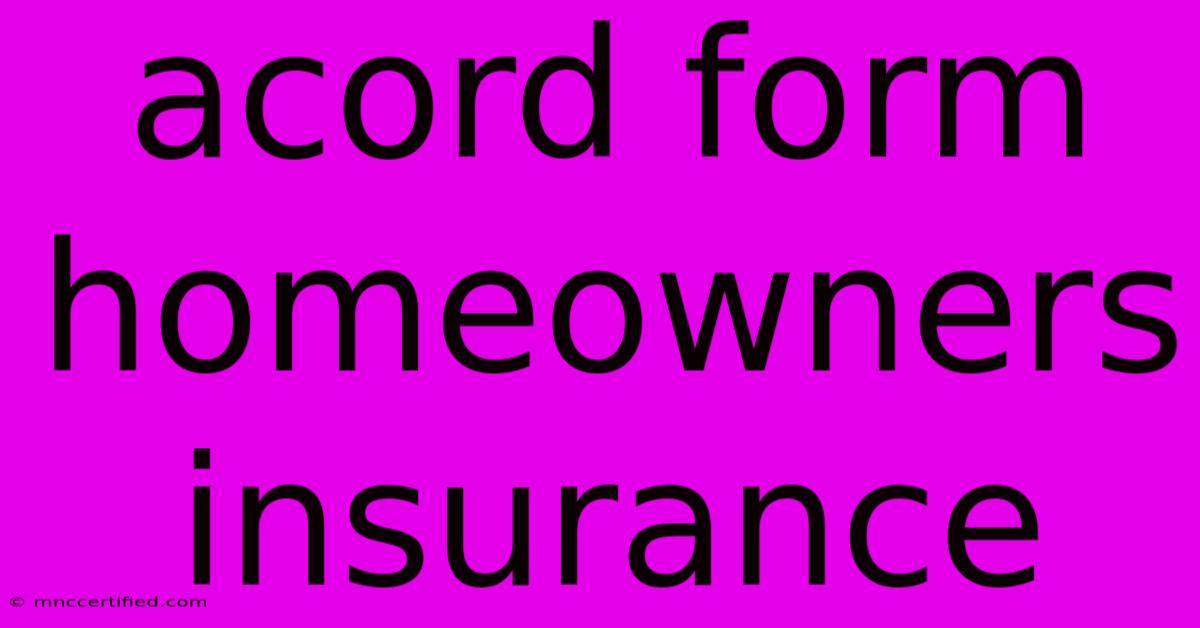Acord Form Homeowners Insurance

Table of Contents
Understanding and Choosing the Right ACORD Form for Homeowners Insurance
Finding the right homeowners insurance can feel overwhelming. Navigating the paperwork, especially the various ACORD forms, adds another layer of complexity. This article will demystify ACORD forms, explaining their purpose, different types, and how to effectively use them to secure the best homeowners insurance coverage.
What is an ACORD Form?
ACORD stands for Association of Cooperative Insurance Representatives. ACORD forms are standardized insurance forms used across the United States to streamline the insurance process for both agents and consumers. They provide a consistent format for gathering information, ensuring everyone is on the same page. For homeowners insurance, these forms are crucial for documenting property details, coverage specifics, and applicant information. Using standardized forms speeds up the process, minimizes errors, and improves communication between insurers and policyholders.
Why are ACORD Forms Important for Homeowners Insurance?
ACORD forms are essential for several reasons:
- Efficient Information Gathering: They provide a structured way to collect all necessary information about your property and insurance needs, eliminating the need for multiple forms or lengthy questionnaires.
- Clear Communication: The standardized format ensures all parties understand the details of the insurance policy, preventing misunderstandings and disputes.
- Faster Processing: Completed ACORD forms allow insurance companies to quickly assess your risk and provide a quote.
- Reduced Errors: The standardized format minimizes the chance of errors and omissions in the application process.
Common ACORD Forms Used in Homeowners Insurance
Several ACORD forms are commonly used in the homeowners insurance process. Some of the most frequently encountered include:
- ACORD 250 (Application for Insurance): This is the primary application form used to gather comprehensive information about the applicant, the property, and the desired coverage. It's often the first form you'll encounter when applying for homeowners insurance. This includes details like your address, property type, coverage amounts desired, and details about any previous claims. Accuracy is crucial when completing this form.
- ACORD 280 (Personal Auto Coverage): Although focused on auto insurance, it's frequently used in conjunction with homeowners insurance, especially if bundled together. It ensures a comprehensive understanding of your overall risk profile.
- ACORD 285 (Commercial Property Coverage): If your home has a business operation, this form might be required.
- ACORD 240 (Request for Loss Information): When filing a claim, this form assists the insurance company in gathering all the necessary information related to the loss or damage.
Tips for Completing ACORD Forms
Completing ACORD forms accurately is vital. Here are some helpful tips:
- Read Carefully: Thoroughly review each question and ensure you understand what information is being requested.
- Be Accurate: Provide precise and accurate information. Inaccurate information can lead to delays or even denial of coverage.
- Complete All Sections: Don't leave any sections blank unless explicitly instructed.
- Seek Clarification: If you have any questions or are unsure about any section, contact your insurance agent for clarification before submitting the form.
- Keep Copies: Always keep copies of all completed ACORD forms for your records.
Finding the Right Homeowners Insurance: Beyond the Forms
While ACORD forms are essential, they are only part of the process. Choosing the right homeowners insurance policy requires careful consideration of your specific needs and risk profile. Factors to consider include:
- Coverage Amount: Ensure you have adequate coverage to rebuild your home and replace your belongings in the event of a covered loss.
- Deductible: Understand the implications of different deductible amounts. A higher deductible means lower premiums, but you'll pay more out of pocket in the event of a claim.
- Policy Features: Consider optional coverages like flood insurance, earthquake insurance, and personal liability coverage. These are not always included in standard policies.
- Insurance Company Reputation: Research the financial stability and customer service ratings of different insurance companies.
By understanding ACORD forms and the broader context of homeowners insurance, you can navigate the process more confidently and secure the best coverage for your home and belongings. Remember that accurate information is key to a smooth and efficient insurance experience.

Thank you for visiting our website wich cover about Acord Form Homeowners Insurance. We hope the information provided has been useful to you. Feel free to contact us if you have any questions or need further assistance. See you next time and dont miss to bookmark.
Featured Posts
-
Lighthouse Insurance Group Holland
Nov 23, 2024
-
Stolen Car Insurance Claim Lawyer
Nov 23, 2024
-
Trading In A Car With Body Damage
Nov 23, 2024
-
Rare Prince Guitar Auction Record
Nov 23, 2024
-
Missing Man Mpd Urges Hunters To Help Find Eric Boll
Nov 23, 2024